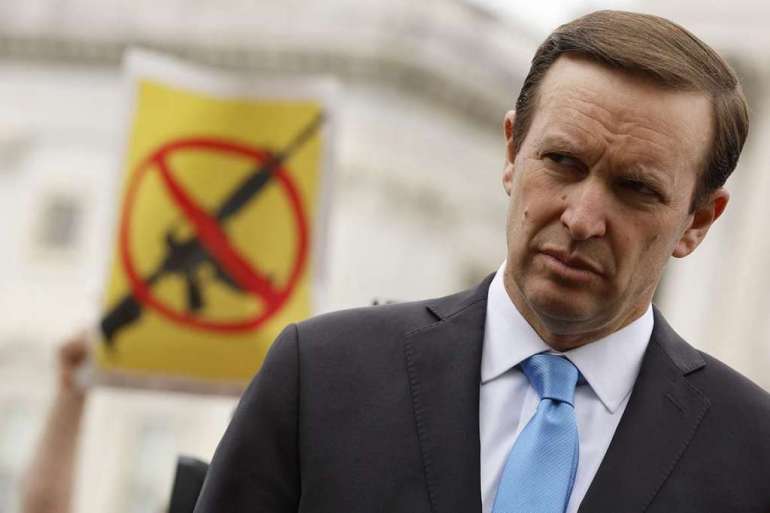Lawmakers offer mild optimism about gun legislation

“I get it,” he said. “Every single time after one of these mass shootings, there’s talks in Washington, and they never succeed. But there are more Republicans interested in talking about finding a path forward this time than I have ever seen since Sandy Hook.”
Murphy has long been an advocate for changing the nation’s gun laws, particularly since the 2012 mass shooting at Sandy Hook Elementary School in his home state of Connecticut. Last week’s mass shooting at Robb Elementary School in Uvalde, Texas, evoked memories of the Sandy Hook shootings for many, as it was another example of an outsider coming to kill small children at an elementary school. Nineteen children and two adults were killed in Uvalde.
The senator spoke angrily to his colleagues on the Senate floor immediately after the Texas shooting on Tuesday: “Why are you here, if not to solve a problem as existential as this?”
But on Sunday, Murphy cited a number of areas where he saw potential for agreement, including red flag laws, increased background checks, safe storage requirements, mental health resources and more security dollars for schools.
He also said while he would like to be more ambitious in some areas, he was “not going to let the perfect be the enemy of the good.”
When asked by host Jonathan Karl, he said there was also some discussion on raising the age to 21 to purchase assault weapons. The killer in Texas was 18 years old as was the suspect charged in the recent mass shooting in a Buffalo supermarket.
“I don’t yet know exactly what’s possible, whether the votes are there to raise the age, but we’re having a discussion about what we do about that specific profile and it’s an encouraging conversation,” he said.
Speaking later on the same show, Rep. Adam Kinzinger (R-Ill.) said he was encouraged by Murphy’s remarks.
“He is really focusing on what can I actually do at this moment,” Kinzinger said of Murphy. “He gets a lot of a credit for that. That’s a hard thing, a hard thing to do.”
Senate Minority Leader Mitch McConnell has deputized Texas Sen. John Cornyn to work with Democrats on the issue. Speaking on CNN’s “State of the Union,” Senate Majority Whip Dick Durbin (D-Ill.) encouraged Murphy and Cornyn to accomplish the most they can.
“Do the right thing and do as much as you can do. Let’s join together, if we can, on a bipartisan basis to show the American people that what happened in Uvalde was not in vain,” Durbin said.
Like Murphy and Kinzinger, Durbin said he saw signs that the logjam on gun issues was about to be broken in Washington.
“It just is so compelling,” Durbin told host Dana Bash, “to see the photos of these young boys and girls, and to picture your own children or grandchildren captives of this madman as he’s killing them off one by one in that school, and realize, it is time for us to do something. America is sick and tired of political excuses.”
Arkansas Gov. Asa Hutchinson, a Republican, saw positive signs as well.
“I think the senators that are coming together in a bipartisan way to talk about what we can agree upon is important,” he said on CBS’ “Face the Nation. “I’ve communicated with a number of governors. I would like to see a similar bipartisan working group of governors, Democrats and Republicans, seeing what is it we can agree upon.”
Not everyone was expecting much to come out of the current round of talks.
Sen. Cory Booker (D-N.J.) pointed out that anti-lynching legislation had finally passed after decades of failure to do so. He said he hoped something would be done this time about guns but doubted that whatever is enacted will be enough.
“Whatever we can get done, if it saves a life, it’s worth doing,” he said on NBC’s “Meet the Press.” “And so, my colleagues who are entering the bipartisan talks, I fully support that, but I’m under no illusion that we’re going to do the things that need to be done.”
Rep. Dan Crenshaw (R-Texas) didn’t see much to like in any of the current crop of federal gun proposals, offering specific concerns about each of them and wondering whether they would actually accomplish what they are intended to. “When it comes to criminal law, that really should be democratically decided at the local and state level, but, even so, you have to look at these and wonder what the actual purpose is,” he said on “State of the Union.”
For his part, Murphy said he realized these talks still might not go anywhere.
“In the end, I may end up being heartbroken,” he said.